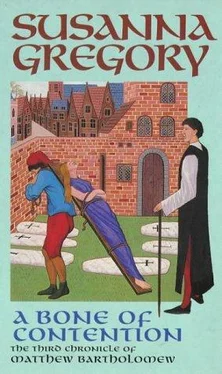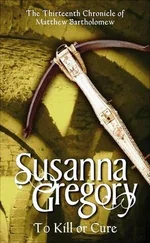‘I could be wrong,’ said Bartholomew. He stood and stretched, giving such a huge yawn that Michael was compelled to join him.
Michael tossed his apple core into the grass. ‘Simon d’Ambrey died twenty-five years ago,’ he said thoughtfully. ‘Perhaps even at the same time as this child. Can you tell how this child met its death?’
‘Again, I cannot be certain,’ said Bartholomew, rubbing his eyes tiredly. ‘But there is a deep dent on the back of the skull that would have compressed the brain underneath. Had the child been alive when that wound was delivered, it would have killed him – or her – without doubt. However, if the body has lain in the King’s Ditch for thirty years, the damage may have been done at any time since by something falling on it. So, this child may have been knocked on the head and disposed of in the Ditch; he may have fallen and hit his head; or he may have died of some disease and his body disposed of in the Ditch and the skull damaged later.’
Michael disagreed. ‘Not the latter. Why would anyone need to hide a corpse of someone who had died in a legitimate manner? And surely someone would miss a child if it had had an accident and fallen in the river? The only likely solution, I am sorry to say, is the first one. That the poor thing was killed and the body hidden in the Ditch.’
Bartholomew shook his head, smiling, and slapped his friend on the shoulders. ‘You have become far too involved in murder these last few years,’ he said. ‘Now you look for it where there may be none. How do you know the child was not an orphan, or that his parents simply did not report him missing? You know very well that a death in a large, poor family is sometimes seen as more of a relief than a cause for grief, in that it is one less mouth to feed – especially with girls. Or perhaps he was one of a group of travellers, who had passed out of Cambridge before he was missed? Or perhaps he was a runaway from…’
‘All right, all right,’ grumbled Michael good-humouredly. ‘Point taken. But you were in Cambridge as a child. Did any of your playmates go missing with no explanation?’
Bartholomew leaned down to pick up his medicine bag. ‘Not that I recall. It was a long time ago.’
‘Oh, come now, Matt!’ exclaimed Michael. ‘You are not an old man yet! If you are right in your hunch about the time of this child’s death, he may well have been a playmate of yours. Older than you, perhaps, but you would have been children together.’
Bartholomew yawned again. ‘I can think of none, and I did not play with girls, anyway, which means I only have knowledge of half of the juvenile population. You should ask someone else. And now it is late, and so I will wish you good night.’
He turned to walk back through the orchard to the College, leaving Michael to his musing. He cut through the kitchens, his leather-soled shoes skidding on the grease that formed an ever-present film over the stone-flagged floor. The great cooking fires were banked for the night, and the kitchens were deserted.
A door, concealed behind a painted wooden screen, led from the kitchen to the porch where Michaelhouse’s guests were received before being ushered to the hall and conclave above. Bartholomew walked through the porch, and across the beaten earth of the courtyard to his room in the north wing.
The last rays of the sun were fading, and the honey-coloured stone of Michaelhouse’s walls was a dark amber.
Bartholomew paused, and glanced around at the College, admiring, as he always did, the delicate tracery on the windows of the north and south wings where the scholars slept. The dying sunlight still caught the bright colours of the College founder’s coat of arms over the porch, a cacophony of reds, blues and golds. He yawned yet again, and gave up the notion of reading for an hour by the light of a candle before he slept – all that would happen would be that he would fall asleep at the table and candles were far too expensive a commodity to waste, not to mention the possibility that an unattended candle might fall and set the whole College alight.
His mind wandered back to the grisly display of asphyxiated corpses in the Market Square some twenty- five years ago, the result of another careless candle if the burgesses were to be believed. Then, he pushed thoughts of murder and mayhem to the back of his mind, opening the door to his small, neat room. He lay on the bed, intending to rest for a few moments before rising again to wash and fold his clothes, but he was almost immediately asleep, oblivious even to the sharp squeal of a mouse that the College cat killed under his bed.
Alone in the orchard, Michael chewed his lip thoughtfully.
Bartholomew had a sister who lived nearby, whose husband was one of the richest and most influential merchants in the town. Edith was some years older than her brother. She had married young, and Bartholomew had lived with her and her new husband until he went to the school at the Benedictine Abbey in the city of Peterborough to the north. Perhaps Edith, or her husband, Sir Oswald Stanmore, might remember something about a missing child.
Michael saw the Stanmores the following day on his way back from church. It was a fine Sunday afternoon, and the streets thronged with people. Gangs of black-gowned students sang and shouted, eyed disapprovingly by the merchants and tradesmen dressed in their Sunday finery.
Edith and her husband looked happy and prosperous, walking arm-in-arm down Milne Street to the large house where Stanmore had his business premises. Although Stanmore worked in Cambridge, he preferred to live at his manor in Trumpington, a tiny village two miles south of the town. It was unusual to see him and his wife in Cambridge on a Sunday, and Michael strongly suspected that the merchant had been conducting some covert business arrangement when he should have been paying attention to the words of the priest at mass. Edith, a lively soul who enjoyed the occasional excursion into the town from the village, would not have noticed what her husband was doing, and would have been more interested in catching up with the local gossip from the other merchants’ wives.
Edith had the same distinctive black hair and pale complexion of her brother, a stark contrast to Stanmore’s slate-grey hair and beard. She wore a dress of deep crimson, and she carried a blue cloak over one arm, one corner of it trailing unheeded along the dusty road. With a smile, the monk recognised that she apparently had the same careless disregard for clothes as her brother, whose shirts and hose were always patched and frayed.
He headed towards her, dodging past a procession of Carmelite friars heading towards St Mary’s Church, and jostling aside a pardoner with unnecessary force. Michael did not like pardoners.
Edith hugged Michael affectionately, making the usually sardonic, and occasionally lecherous, monk blush. Oswald Stanmore admonished her for her undignified behaviour in the street, but his words lacked conviction, and they all knew she would do exactly the same when she next met Brother Michael.
Stanmore, ever aware of the latest happenings in the town from his extensive network of informants, asked Michael about the skeleton that had been found.
Michael told them briefly, and asked whether they were aware of any missing children during the last twenty or thirty years.
‘Thirty years!’ exclaimed Edith. ‘Has this body lain in the Ditch so long?’
Michael shrugged indifferently. ‘No, no. I am just keen to ensure we do not confine ourselves to looking recently, when the child may have died much earlier.’
Stanmore scratched his chin as he wracked his brains.
‘There was old Mistress Wilkins’ daughter,’ he said uncertainly.
Edith shook her head. ‘Reliable witnesses saw her alive and married to a farm lad over in Haslingfield village a few weeks after she disappeared. What about the tinker’s boy? The one who was said to have drowned near the King’s Mill?’
Читать дальше












